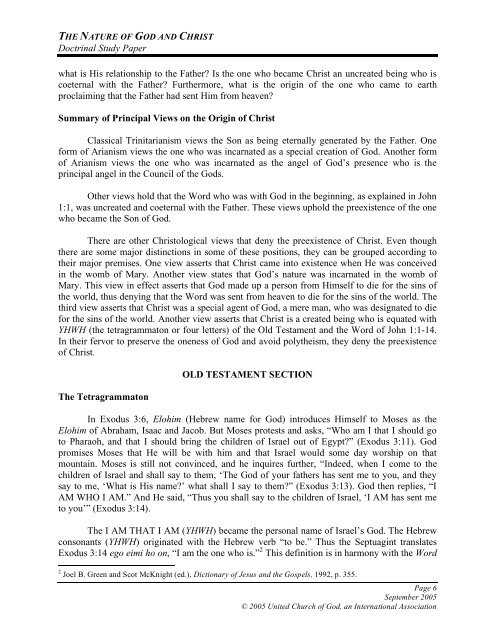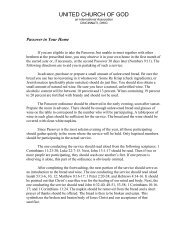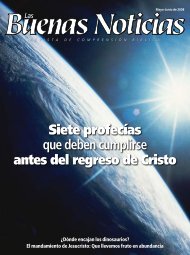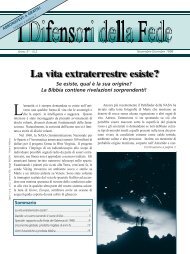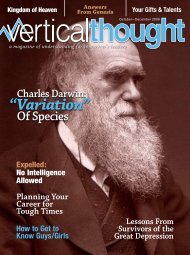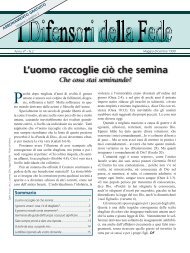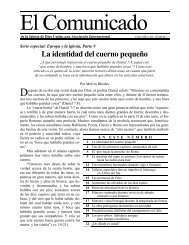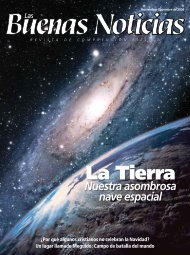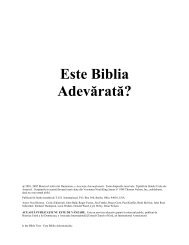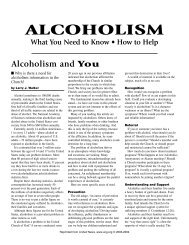The Nature of God and Christ - Members Site - United Church of God
The Nature of God and Christ - Members Site - United Church of God
The Nature of God and Christ - Members Site - United Church of God
- No tags were found...
Create successful ePaper yourself
Turn your PDF publications into a flip-book with our unique Google optimized e-Paper software.
THE NATURE OF GOD AND CHRISTDoctrinal Study Paperwhat is His relationship to the Father? Is the one who became <strong>Christ</strong> an uncreated being who iscoeternal with the Father? Furthermore, what is the origin <strong>of</strong> the one who came to earthproclaiming that the Father had sent Him from heaven?Summary <strong>of</strong> Principal Views on the Origin <strong>of</strong> <strong>Christ</strong>Classical Trinitarianism views the Son as being eternally generated by the Father. Oneform <strong>of</strong> Arianism views the one who was incarnated as a special creation <strong>of</strong> <strong>God</strong>. Another form<strong>of</strong> Arianism views the one who was incarnated as the angel <strong>of</strong> <strong>God</strong>’s presence who is theprincipal angel in the Council <strong>of</strong> the <strong>God</strong>s.Other views hold that the Word who was with <strong>God</strong> in the beginning, as explained in John1:1, was uncreated <strong>and</strong> coeternal with the Father. <strong>The</strong>se views uphold the preexistence <strong>of</strong> the onewho became the Son <strong>of</strong> <strong>God</strong>.<strong>The</strong>re are other <strong>Christ</strong>ological views that deny the preexistence <strong>of</strong> <strong>Christ</strong>. Even thoughthere are some major distinctions in some <strong>of</strong> these positions, they can be grouped according totheir major premises. One view asserts that <strong>Christ</strong> came into existence when He was conceivedin the womb <strong>of</strong> Mary. Another view states that <strong>God</strong>’s nature was incarnated in the womb <strong>of</strong>Mary. This view in effect asserts that <strong>God</strong> made up a person from Himself to die for the sins <strong>of</strong>the world, thus denying that the Word was sent from heaven to die for the sins <strong>of</strong> the world. <strong>The</strong>third view asserts that <strong>Christ</strong> was a special agent <strong>of</strong> <strong>God</strong>, a mere man, who was designated to diefor the sins <strong>of</strong> the world. Another view asserts that <strong>Christ</strong> is a created being who is equated withYHWH (the tetragrammaton or four letters) <strong>of</strong> the Old Testament <strong>and</strong> the Word <strong>of</strong> John 1:1-14.In their fervor to preserve the oneness <strong>of</strong> <strong>God</strong> <strong>and</strong> avoid polytheism, they deny the preexistence<strong>of</strong> <strong>Christ</strong>.<strong>The</strong> TetragrammatonOLD TESTAMENT SECTIONIn Exodus 3:6, Elohim (Hebrew name for <strong>God</strong>) introduces Himself to Moses as theElohim <strong>of</strong> Abraham, Isaac <strong>and</strong> Jacob. But Moses protests <strong>and</strong> asks, “Who am I that I should goto Pharaoh, <strong>and</strong> that I should bring the children <strong>of</strong> Israel out <strong>of</strong> Egypt?” (Exodus 3:11). <strong>God</strong>promises Moses that He will be with him <strong>and</strong> that Israel would some day worship on thatmountain. Moses is still not convinced, <strong>and</strong> he inquires further, “Indeed, when I come to thechildren <strong>of</strong> Israel <strong>and</strong> shall say to them, ‘<strong>The</strong> <strong>God</strong> <strong>of</strong> your fathers has sent me to you, <strong>and</strong> theysay to me, ‘What is His name?’ what shall I say to them?” (Exodus 3:13). <strong>God</strong> then replies, “IAM WHO I AM.” And He said, “Thus you shall say to the children <strong>of</strong> Israel, ‘I AM has sent meto you’” (Exodus 3:14).<strong>The</strong> I AM THAT I AM (YHWH) became the personal name <strong>of</strong> Israel’s <strong>God</strong>. <strong>The</strong> Hebrewconsonants (YHWH) originated with the Hebrew verb “to be.” Thus the Septuagint translatesExodus 3:14 ego eimi ho on, “I am the one who is.” 2 This definition is in harmony with the Word2 Joel B. Green <strong>and</strong> Scot McKnight (ed.), Dictionary <strong>of</strong> Jesus <strong>and</strong> the Gospels, 1992, p. 355.Page 6September 2005© 2005 <strong>United</strong> <strong>Church</strong> <strong>of</strong> <strong>God</strong>, an International Association


